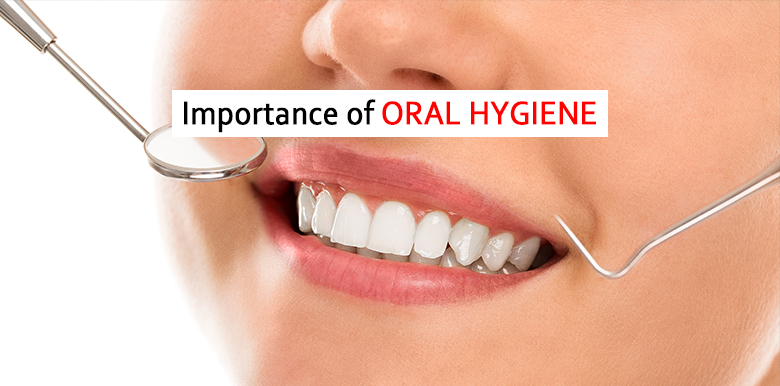The human body is interconnected with other parts. Because of the way, the human body is made, one area of the body can have an impact on different parts of the body. For example, take the mouth and teeth. If you have problem with your teeth and gum, this can pose problems with other areas. Poor oral hygiene can lead to problems with diabetes, heart disease and other health issues.
Oral health touches every aspect of our lives but is often taken for granted. Your mouth is a window into the health of your body. It can show signs of nutritional deficiencies or general infection.
Importance of Oral hygiene –

Oral hygiene
Although genetics play a large role in whether you get cavities, regular brushing and preventative dental care help keep your teeth and gums healthy. Brushing removes the plaque that causes tooth decay and stimulates your gums to help prevent gum disease.
Your Mouth, the Gateway to Your Body
To understand how the mouth can affect the body, it helps to understand what can go wrong in the first place. Bacteria that builds up on teeth make gums prone to infection. The immune system moves in to attack the infection and the gums become inflamed. The inflammation continues unless the infection is brought under control.
Over time, inflammation and the chemicals it releases eat away at the gums and bone structure that hold teeth in place. The result is severe gum disease, known as periodontitis. Inflammation can also cause problems in the rest of the body.
Oral Health and Diabetes

Oral health and Diabetes
The working relationship between diabetes and periodontitis may be the strongest of all the connections between the mouth and body. Inflammation that starts in the mouth seems to weaken the body’s ability to control blood sugar. People with diabetes have trouble processing sugar because of a lack of insulin, the hormone that converts sugar into energy.
Oral Health and Heart Disease

Oral Health and Heart Disease
Though the reasons are not fully understood, it’s clear that gum disease and heart disease often go hand in hand. Up to 91% of patients with heart disease have periodontitis, compared to 66% of people with no heart disease. The two conditions have several risk factors in common, such as smoking, unhealthy diet, and excess weight. And some suspect that periodontitis has a direct role in raising the risk for heart disease as well.
Oral Health and Osteoporosis

Oral Health and Osteoporosis
Osteoporosis and periodontitis have an important thing in common, bone loss. The link between the two, however, is controversial. Cram points out that osteoporosis affects the long bones in the arms and legs, whereas gum disease attacks the jawbone. Others point to the fact that osteoporosis mainly affects women, whereas periodontitis is more common among men.
Though a link has not been well established, some studies have found that women with osteoporosis have gum disease more often than those who do not. Researchers are testing the theory that inflammation triggered by periodontitis could weaken bone in other parts of the body.
Oral Health and Smoking

Oral Health and Smoking
Not smoking is one of the most important things you can do for your mouth and your body. According to the CDC, a smoker’s risk of severe gum disease is three times higher than someone who does not smoke.
Follow a few basic rules of dental hygiene:
1. Eat healthy and avoid sugary snacks.
2. Don’t use tobacco products.
3. Rinse your mouth out after meals or chew sugarless gum.
4. Brush at least twice a day.
5. Protect your teeth with a mouth guard during athletics.
6. Have your dentist apply sealant to your children’s teeth.
7. Get regular dental exams.

Dental Exam
Most people today enjoy excellent oral health and are keeping their natural teeth throughout their lives; however, cavities remain the most prevalent chronic disease of childhood. Some 100 million people fail to see a dentist each year, even though regular dental examinations and good oral hygiene can prevent most dental disease. Many people believe that they need to see a dentist only if they are in pain or think something is wrong, but regular dental visits can contribute to a lifetime of good oral health. If you are experiencing dental pain, don’t put off seeing a dentist. With dentistry’s many advances, diagnosis and treatment are more sophisticated and comfortable than ever.
